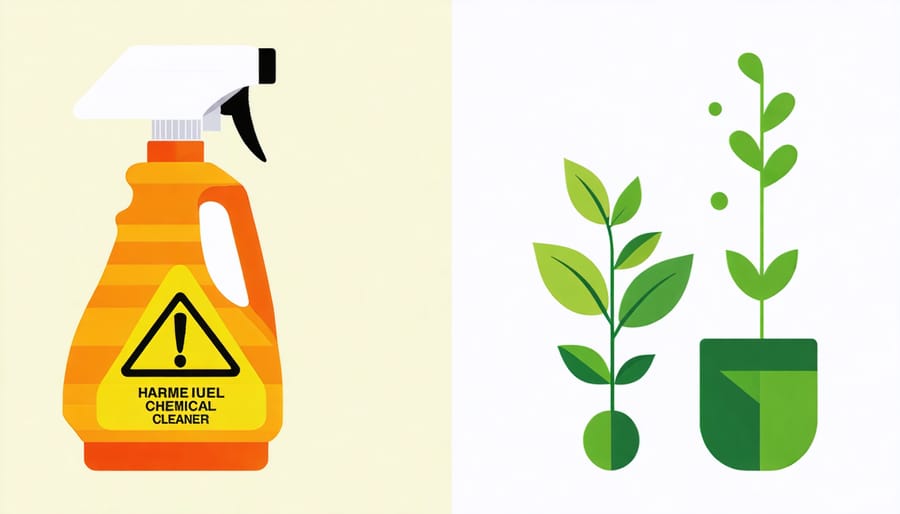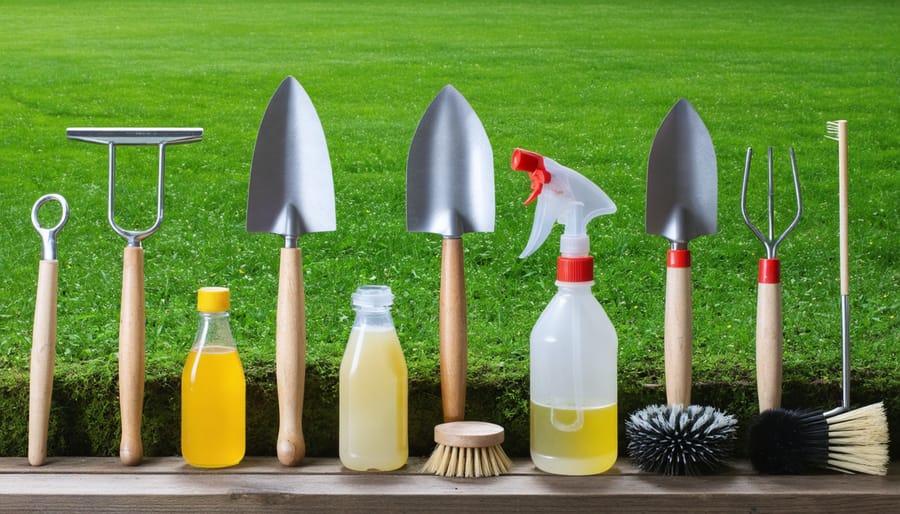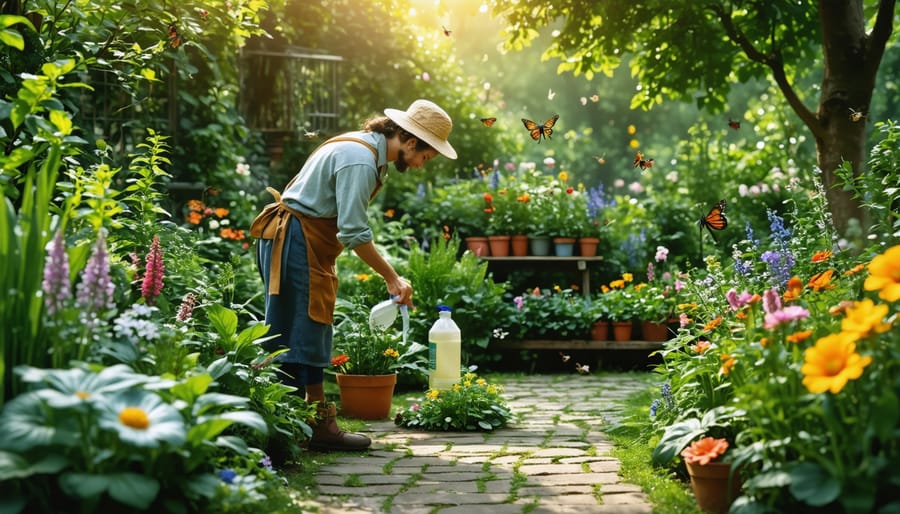Transform your garden cleaning routine with natural, plant-safe alternatives that protect both your garden and the environment. Organic garden maintenance starts with choosing the right cleaning solutions, and leading suppliers like mustanghygiene.co.uk offer eco-certified options for every need. Replace harsh chemical cleaners with vinegar-based solutions for pathways and garden furniture, achieving powerful results without compromising soil health. Mix one part baking soda with two parts water to create an effective, non-toxic cleaner for garden tools and greenhouse surfaces that naturally inhibits mold growth. Consider enzyme-based cleaners derived from beneficial bacteria, specifically formulated to break down organic matter while enriching your garden soil. These earth-friendly alternatives not only protect your plants and beneficial insects but also contribute to a healthier, more sustainable garden ecosystem that thrives naturally.
Why Traditional Commercial Cleaners Can Harm Your Garden

Common Toxic Ingredients to Avoid
When maintaining your garden, it’s crucial to be aware of harmful chemicals commonly found in traditional cleaning products. Phosphates, often present in many cleaners, can disrupt the natural balance of your soil and harm beneficial microorganisms. Another concerning ingredient is chlorine bleach, which not only kills harmful bacteria but also destroys helpful soil organisms and can damage your plants’ root systems.
Ammonia-based cleaners pose risks to both your garden and your health, potentially burning plant leaves and releasing harmful fumes. Synthetic fragrances and phthalates, while making products smell nice, can accumulate in soil and affect plant growth. Keep an eye out for products containing triclosan, an antibacterial agent that can harm beneficial insects and contaminate groundwater.
Parabens and formaldehyde-releasing preservatives are other ingredients to avoid, as they can persist in soil long after use. Finally, watch out for petroleum-based surfactants, which can create a barrier in soil that prevents proper water absorption and root development. By being mindful of these ingredients, you can better protect your garden’s ecosystem and your family’s health.
Long-term Environmental Impact
When we spray chemical cleaners in our gardens, they don’t just disappear after use. These harsh products seep into the soil, affecting its delicate balance and the countless microorganisms that keep our gardens healthy. Over time, chemical residues can build up, making the soil less fertile and potentially toxic for beneficial insects, earthworms, and essential soil bacteria.
The impact extends beyond our garden borders. Rain and irrigation can wash these chemicals into local waterways, affecting Edmonton’s river ecosystem and the wildlife that depends on it. Chemical cleaners can also harm beneficial insects like bees and butterflies, which are crucial for pollination and maintaining a thriving garden environment.
Many traditional cleaning products contain phosphates and nitrogen compounds that can lead to excessive algae growth in our local water bodies. This process, known as eutrophication, depletes oxygen levels and threatens aquatic life. By choosing eco-friendly alternatives, we’re not just protecting our immediate garden space – we’re contributing to the health of our entire local ecosystem and ensuring our children can enjoy these natural spaces for years to come.
Natural Cleaning Solutions for Garden Equipment

Vinegar-Based Solutions
Vinegar is a versatile and budget-friendly cleaning solution that’s perfect for garden tool maintenance and various outdoor cleaning tasks. Mix one part white vinegar with one part water for a basic cleaning solution that’s tough on dirt but gentle on plants. For stubborn grime on garden tools or patio furniture, increase the vinegar concentration to two parts vinegar and one part water. Add a tablespoon of eco-friendly dish soap to boost cleaning power for particularly grimy surfaces. To prevent rust on metal tools, wipe them down with straight vinegar after cleaning, then dry thoroughly. Avoid using vinegar solutions on natural stone surfaces or near acid-sensitive plants. For greenhouse glass cleaning, add a splash of lemon juice to your vinegar solution for extra sparkle and a fresh scent.
Essential Oil Cleaners
Essential oils aren’t just for aromatherapy – they’re powerful natural disinfectants perfect for garden tool cleaning and maintenance. Tea tree oil, known for its antimicrobial properties, makes an excellent cleaner when mixed with water and a splash of white vinegar. We love using lavender oil for its gentle yet effective cleaning power, especially on wooden handles and garden furniture. Lemon and eucalyptus oils are fantastic for tackling tough grime while leaving behind a fresh, natural scent. For a simple DIY cleaner, combine 10-15 drops of your chosen essential oil with two cups of water in a spray bottle. These natural solutions are safe for your garden tools and won’t harm your precious plants or local ecosystem. Remember to always dilute essential oils properly and test on a small area first.
Safe Cleaning Products for Garden Furniture and Structures
When it comes to keeping your outdoor furniture and structures looking their best, you don’t need harsh chemicals that could harm your garden or the environment. Here in Edmonton, where we love our outdoor spaces, there are plenty of eco-friendly options that work just as effectively.
For wooden furniture and pergolas, a simple mixture of warm water and mild castile soap works wonders. This gentle solution cleans effectively without stripping protective finishes or releasing harmful chemicals into your garden soil. For tougher stains, try adding a splash of white vinegar to your cleaning solution – it’s particularly effective on mildew and algae growth that’s common in our climate.
Baking soda makes an excellent natural scrubbing agent for metal or plastic furniture. Create a paste with water and gently work it into stubborn stains. For glass surfaces, like greenhouse panels or table tops, a solution of equal parts water and white vinegar with a few drops of lemon essential oil will leave them sparkling clean and streak-free.
For larger structures like sheds or fencing, consider using oxygen bleach (sodium percarbonate). Unlike chlorine bleach, it breaks down into water and oxygen, making it safe for your plants and soil. Mix it with warm water according to package directions for a powerful yet eco-friendly cleaner.
Remember to test any cleaning solution on a small, inconspicuous area first. And when possible, clean your garden furniture on an overcast day to prevent cleaning solutions from evaporating too quickly in direct sunlight. This ensures better results and helps conserve water – something we can all feel good about!

Making Your Own Garden-Safe Cleaning Products
Creating your own garden-safe cleaning solutions is easier than you might think, and you probably already have many of the ingredients in your kitchen! Here are some of our favorite DIY recipes that are both effective and gentle on your garden tools and plants.
For a basic all-purpose cleaner, mix equal parts white vinegar and water in a spray bottle. This solution works wonders on garden tools, pots, and greenhouse surfaces. Add a few drops of lemon essential oil for extra cleaning power and a fresh scent.
To tackle tough rust on metal tools, make a paste using baking soda and water. Apply the paste, let it sit for 15 minutes, then scrub with a wire brush. For wooden handles, rub them down with a mixture of one part linseed oil and one part vinegar to clean and protect the wood.
For cleaning garden furniture, combine 2 tablespoons of castile soap with 2 cups of warm water. This gentle solution is perfect for wooden, metal, or plastic outdoor furniture without harming nearby plants.
Need to clean your greenhouse glass? Mix 2 cups of water with 1/4 cup of white vinegar and a tablespoon of cornstarch. This solution leaves windows streak-free and won’t harm your greenhouse plants.
Remember to always test any homemade solution on a small area first, and store your DIY cleaners in clearly labeled bottles away from children and pets.
Making the switch to eco-friendly garden cleaning products isn’t just better for your plants – it’s a gift to our entire Edmonton community and environment. By choosing natural cleaners, you’re protecting our local wildlife, preserving our soil quality, and keeping harmful chemicals out of our water systems. Whether you opt for commercial eco-friendly products or create your own DIY solutions, every sustainable choice makes a difference. Start small by replacing one conventional cleaner at a time, and you’ll soon discover that effective garden maintenance doesn’t require harsh chemicals. Together, we can cultivate cleaner, greener gardens that thrive naturally and contribute to a healthier environment for generations to come. Let’s make eco-friendly garden cleaning the new standard in our community!

